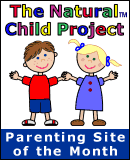| I
make sure that there isn't any candy in the house, and I only feed
my children foods sweetened with honey or fruit juice. I can't understand
why they seem so fidgety. Honey
and maple syrup are natural foods, but children should restrict
their consumption of all sugars. I recommend that honey and maple
syrup be forbidden for infants under 18 months. Although some
experts disagree, researchers have found that children suffering
from behavior disorders or learning disabilities can demonstrate
dramatic improvements when sugar and junk foods are removed from
their diets.
"Fruit juice
sweetened" foods are equally bad. The so-called "fruit
juice" is really only the sugar from the fruit, refined so
that the flavor, many of the nutrients, and the fiber of the fruit
are removed. What's left is plain old sugar water. "Fruit
juice sweetened" foods are no healthier for you than the
sugared variety.
While most products
list their contents, it's still easy to be fooled. Have you ever
looked at the label on a bottle of catsup? Remember that ingredients
are listed according to the amount found in the product, with
the predominate ingredient listed first. Look at that catsup label!
You'll find sugar is listed in the first or second position. That
supposedly harmless condiment is full of sugar. And I don't have
to say anything about breakfast cereals, do I? Again, sugar is
often right at the top of the list.
I recommend that
you satisfy your child's sweet tooth with fruit. An apple, for
instance, contains a high percentage of water. So the sugar in
an apple is diluted and comes in small amounts. You'd have to
eat a lot of apples to ingest the same amount of sugar that's
in one candy bar. With the apple and other fruit, you get the
added benefits of nutrients and fiber. With a candy bar, you get
substances you don't want like oils and added ingredients.
Unfortunately,
sugar is a food that's almost addictive. Simple sugars, like those
found in processed foods, are digested and absorbed into the bloodstream
very quickly.
This sudden influx
of sugar elevates the level of insulin in the system. Insulin
counteracts the sugar level, knocking it back down swiftly. Instead
of slowly rising after breakfast, reaching a plateau, falling
again before lunch, and then repeating the process throughout
the day in a series of gentle curves, the rising and falling sugar
levels become a jagged line of swift ascents and descents. The
ingestion of simple sugars, like fruit, honey, or maple syrup,
makes the body crave more sugar. The person who has doughnuts
and coffee for breakfast is probably going to need more doughnuts
and coffee within just a couple of hours. If the sugar-eater is
a child, you'll have a very busy little person on your hands.
If you make note of what your children eat and how their behavior
deteriorates after eating, it won't take you long to equate "hyperactivity"
with food. Give a toddler sugar for breakfast, and you'll have
a morning of "terrible twos" behavior ahead of you.
A snack of sweet, milky cocoa with marshmallows and cookies will
mean a fidgety child for the rest of the afternoon. And the child
who eats sugar before bedtime will probably be cranky, whining,
and awake two hours later.
Children become
addicted to sugar because it tastes good and it makes them feel
silly and out-of-control. I strongly suggest that you keep sugar
out of your children's diets for a week or two and then evaluate
the changes in behavior. Almost without exception, simple changes
in the diet mean major changes in the child's temperament and
behavior. In children who are already on healthy diets, it's very
easy to trace. If they eat a piece of cake at a birthday party,
they are awake half the night. Because their diets are cleaner,
the sugar effect is noticeable immediately.
This opinion isn't
shared by everyone in the medical community. But after over 20
years in practice, I stand by it as do many other doctors and
nutritionists.
I urge you to read
all labels carefully. Know how much sugar your child is eating
and try to cut out as much as you can. Children who avoid sugar
don't miss it, and their parents don't miss the constant misbehavior
of their sugar-eating off-spring. |



